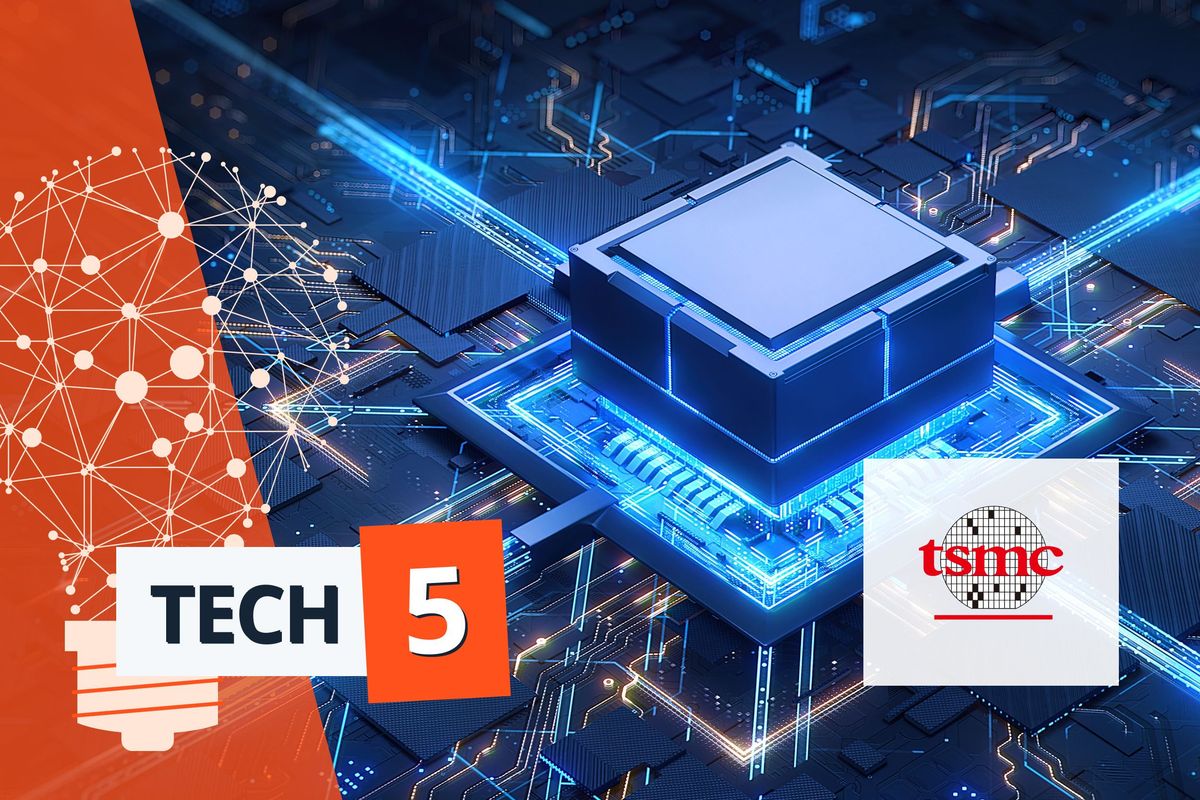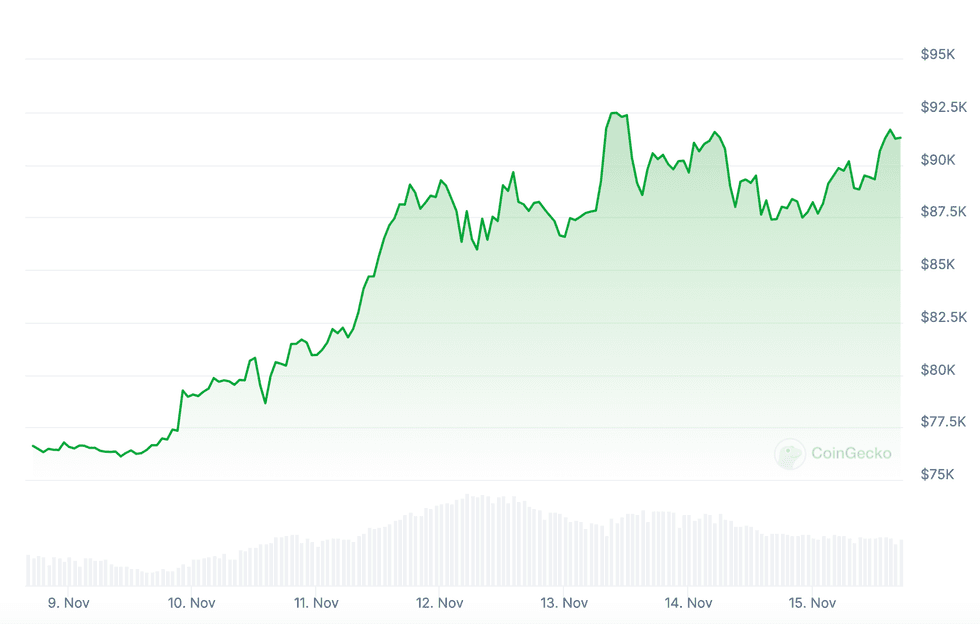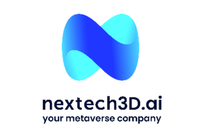Tech 5: TSMC Gets US$6.6 Billion Biden Admin Grant, Bitcoin Price Hits New All-time High
This week also brought the latest quarterly results from Foxconn and Applied Materials, while nuclear power plant developer Oklo said it's secured data center deals.

Bitcoin reached new levels this week, then paused amid speculation about how high it could go.
Meanwhile, the Biden administration finalized a multibillion-dollar arrangement to bring advanced semiconductor manufacturing back to the US, and a nuclear energy firm backed by Sam Altman announced data center supply deals.
Stay informed on the latest developments in the tech world with the Investing News Network's round-up below.
1. Bitcoin price reaches new all-time high
Bitcoin's price has continued to soar in the wake of Donald Trump's US election victory, benefiting from bullish sentiment generated by anticipated crypto-friendly policies from the incoming government. The market capitalization of the crypto industry has surpassed US$3.14 trillion, higher than the GDP of Canada, Brazil and Italy.
After rallying last week, Bitcoin ended this week up 19 percent over seven days, boosted by the prospect of looser regulations and support for innovation under the Trump administration.
The world’s most popular cryptocurrency reached a new all-time high of US$80,000 on Sunday (November 10) and continued its upward trajectory, peaking for the week at US$92,435 on Wednesday (November 13).

Bitcoin performance, November 9 to 15, 2024.
Chart via CoinGecko.
Bitcoin exchange-traded funds (ETFs) experienced a surge in popularity as the price rose, with six consecutive days of inflows totaling US$4.71 billion as of Thursday (November 14). Analysts at Checkmate have identified demand for Bitcoin ETFs as the primary factor driving the surge in Bitcoin demand at the moment.
Additionally, Bitcoin futures open interest climbed to a notable US$55.07 billion.
However, Bitcoin struggled to maintain its hold above US$90,000, falling to the US$87,200 range after US Federal Reserve Chair Jerome Powell’s address in Dallas, Texas, on Thursday. Fresh data on Friday (November 15) morning showed US$400 million of net outflows from Bitcoin ETFs on Thursday, the third highest loss since the funds were listed.
A slight recovery followed later on Friday after news of a lawsuit against the US Securities and Exchange Commission (SEC) and Gary Gensler by 18 Republican attorneys general who are alleging overreach in crypto regulation.
Coinciding with this news, XRP, the native token of Ripple — a company currently involved in legal disputes with the SEC — saw a 17 percent increase in value. The lawsuit challenges the SEC's application of the Howey Test to classify cryptocurrencies as securities, arguing that the SEC's interpretation goes beyond the original scope of the Howey Test.
Plaintiffs, including the DeFi Education Fund, point to the SEC's case against Ripple Labs as a precedent. The judge in that case determined that XRP and similar cryptocurrencies are not inherently securities, even if initially offered as part of an investment contract. This ruling is now being referenced in other legal proceedings.
This ongoing legal challenge could further reshape the regulatory landscape for cryptocurrencies in the US in 2025.
As of 6:00 p.m. EST on Friday, Bitcoin was priced at US$91,246.49.
2. Biden admin finalizes CHIPS Act deal with TSMC
In a push to distribute CHIPS and Science Act funds, the Biden administration has finalized an incentive agreement with Taiwan Semiconductor Manufacturing (TSMC) (NYSE:TSM,TPE:2330).
Under the terms of the deal, the company will receive US$6.6 billion in federal grants to expand operations in the US. In a statement released on Friday (November 15), President Joe Biden said:
“The first of TSMC’s three facilities is on track to fully open early next year, which means that for the first time in decades, an American manufacturing plant will be producing the leading-edge chips used in our most advanced technologies — from our smartphones to autonomous vehicles, to the data centers powering artificial intelligence.”
According to administration officials, TSMC will receive a minimum of US$1 billion out of the total funding awarded this year, since it has already met certain performance targets.
The Biden administration has reportedly been amping up efforts to finalize deals with companies promised CHIPS Act funds, including large firms like Intel (NASDAQ:INTC) and Samsung Electronics (KRX:005930).
Earlier this month, a group of 18 companies sent a letter to the president, urging him to “work with members of your Cabinet and staff across your Administration to remove any roadblocks that may exist, ensuring that the funds highlighted as critical to the success of the objectives of these laws are delivered as promptly as possible.”
The act — which set aside US$39 billion in grants, US$75 billion in loans and loan guarantees and 25 percent tax credits to entice semiconductor companies to manufacture in the US — was criticized as “so bad” by President-elect Donald Trump during his campaign. There is widespread speculation that he may attempt to renegotiate the agreements.
3. Oklo signs letters of intent with data center providers
Oklo (NYSE:OKLO), a company that is developing advanced fission power plants, announced on Wednesday that it has received two letters of intent from major data center providers for up to 750 megawatts of power.
This development marks a major milestone for Oklo, which is backed by OpenAI’s Altman, and underscores the growing demand for sustainable energy solutions within the data center industry.
Oklo says its technology has the potential to revolutionize the way data centers are powered, providing a reliable and sustainable source of energy that can support ever-increasing demand for computing power.
The company focuses on developing micro reactors, which are smaller than traditional nuclear reactors. This makes them a more viable option as they are better suited for a variety of locations and applications.
While Oklo did not specify which data center operators it received the letters of intent from, the news demonstrates the commercial viability of its technology and the growing importance of nuclear power in the energy mix.
4. Applied Materials, Foxconn release quarterly results
Applied Materials (NASDAQ:AMAT), a leading provider of equipment and software used to manufacture semiconductors, unveiled results for its fourth fiscal quarter of 2024 on Thursday.
While the company's performance met market watchers' expectations, its revenue forecast of US$7.15 billion for its first fiscal quarter of 2025 fell short of estimates of US$7.25 billion.
The news resulted in a 9.81 percent decline in Applied Materials' share price for the week.
The company’s lower outlook suggests a slowdown in spending on semiconductor manufacturing equipment and indicates that chipmakers are potentially scaling back production expansion plans.
Meanwhile, Hon Hai Technology Group (Foxconn) (TPE:2354), a global electronics manufacturing giant best known for assembling iPhones, released its Q3 results ahead of expectations. The report highlights growing revenue from artificial intelligence (AI) servers, with orders for these servers making up over 40 percent of overall server revenue.
Foxconn projects that its AI server revenue will continue to grow, accounting for more than 50 percent of server revenue in 2025. The company relies on a steady supply of semiconductors to build these servers and its other products.
Foxconn's focus on server demand aligns with the increasing adoption of cloud computing and other data-intensive technologies, driven by the increasing use of cloud-based AI platforms.
5. OpenAI changes tactics as AI advances slow
According to a report published by the Information on Saturday (November 9), OpenAI's newer intelligence models are not exhibiting the same degree of progress as was observed between GPT-3 and GPT-4.
The news outlet states that testing of OpenAI's newest model, code named Orion, shows that the rate of improvement appears to be slowing down. During testing, Orion struggled to solve problems it hadn't been trained on.
The slowdown comes at a time when the availability of data to train AI models is declining. To address this issue, OpenAI has reportedly created a new team focused on improving its models’ capabilities — its strategies include using synthetic data produced by other AI models to train Orion and alter its post-training processes.
A Reuters article suggests that new training techniques will use more “human-like ways for algorithms to think." AI researchers told Reuters about a technique called test-time computing, which could enhance a model's ability to generate and assess multiple responses before selecting the optimal solution. This method could potentially provide models with increased processing power to tackle complex tasks such as solving math problems and coding.
Sources told Bloomberg that Anthropic and Alphabet (NASDAQ:GOOGL) are seeing similar slowdowns with their newer models, despite investing billions in developing sophisticated AI models and artificial general intelligence (AGI).
“The AGI bubble is bursting a little bit,” said Margaret Mitchell, chief ethics scientist at Hugging Face. “It’s become clear that different training approaches may be needed to make AI models work really well on a variety of tasks.”
Researchers developing new training techniques could shift demand away from chips used to train AI and toward “inference clouds,” described to Reuters by Sequoia Capital partner Sonya Huang as “distributed, cloud-based servers for inference." This is the process of an AI model applying its knowledge to new data before generating results.
Don't forget to follow us @INN_Technology for real-time news updates!
Securities Disclosure: I, Meagen Seatter, hold no direct investment interest in any company mentioned in this article.



